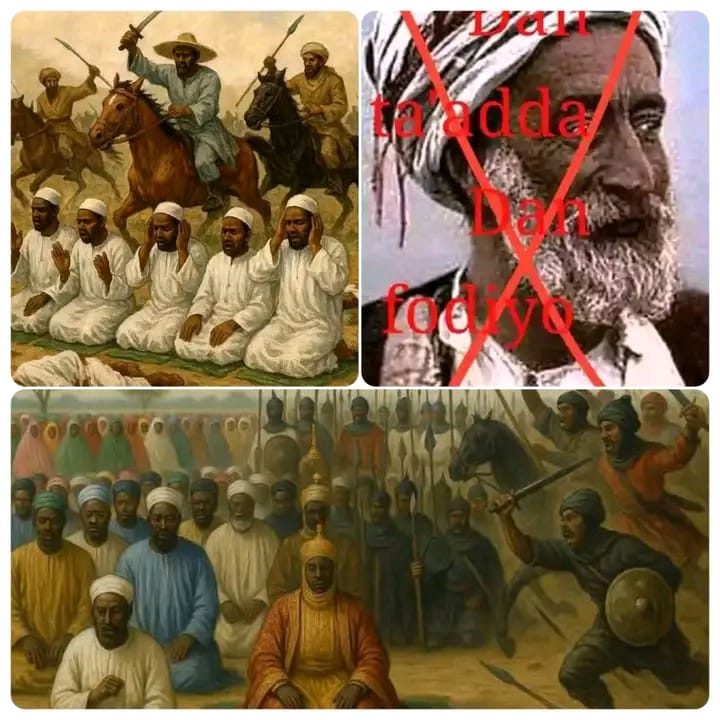The Fulani Rebellion: A History of Contradictions, Broken Promises, and Hausa Marginalization

The Fulani Rebellion: A History of Contradictions, Broken Promises, and Hausa Marginalization
The Fulani Rebellion remains one of the most debated events in West African history, particularly regarding its impact on Hausa-Fulani relations. While often framed as an Islamic revolution against oppression, deeper analysis reveals contradictions in its justification and execution. The Fulani, who were initially welcomed by Hausa rulers and integrated into society, later accused them of injustice, launched a rebellion, and ultimately established a system that was far more oppressive than the one they had overthrown.
Early Fulani-Hausa Relations: A History of Acceptance
The Fulani, traditionally pastoralists, migrated across West Africa in search of grazing land. When they arrived in Hausa territories, they were welcomed by Hausa rulers, who allowed them to settle and granted them access to land and opportunities. The Hausa-Fulani coexistence flourished, with Fulani scholars even studying Islam under Hausa teachers.
However, within a century, tensions began to rise. The Fulani accused their Hausa hosts of oppression and religious corruption, despite having benefited from Hausa hospitality for generations. This shift in relations led to the eventual rebellion that changed the course of history in the region.
The Fulani Call to Global Support and the False Promise of Tax Abolition
As the rebellion intensified, its leader called upon Fulani communities from across the region to join the struggle, presenting it as a fight against injustice. One of the key messages used to attract support was the claim that Islam does not allow taxation. Many Hausa people, believing this promise, joined the jihad, expecting an end to excessive taxation and the establishment of a just system.
However, once the Fulani successfully established their rule under the Sokoto Caliphate, the reality was different. Taxes were not abolished but instead increased over 400 times compared to what existed under Hausa rulers. This betrayal of their initial promise exposed the contradictions in the rebellion’s justification.
Contradictions in the Accusations Against Hausa Rulers
Despite initially benefiting from Hausa hospitality, the Fulani rebellion was fueled by several accusations against Hausa rulers, which upon deeper examination, reveal inconsistencies:
- Claims of Ethnic Discrimination – The Fulani claimed Hausa rulers favored their own people in governance, yet it was the Hausa who had originally accepted and integrated the Fulani into their territories.
- Opposition to Taxation – The Fulani opposed taxes such as the Jangali (cattle tax), yet once in power, they imposed even heavier taxes, especially on the Hausa.
- Fines for Damaging Farmlands – The Fulani objected to being fined for their cattle destroying farmlands, even though these penalties were standard to protect farmers’ rights.
- Religious Criticism – The Fulani accused the Hausa of mixing Islam with traditional beliefs (maguzanci), despite the fact that Hausa scholars had been practicing and teaching Islam for centuries.
The Systematic Exclusion of the Hausa People
Despite playing a crucial role in supporting the jihad, the Hausa people were systematically denied political power after the Fulani established their rule. The Fulani rulers declared themselves the only pure and righteous leaders, claiming that the Hausa lacked the religious and moral purity to govern. This ideology extended even to Hausa Muslims who had joined the movement.
One of the most striking examples of this discrimination was the case of Abdulsalam Bagimbane Alhawasawi, a Hausa leader who had supported the jihad. When he raised concerns about the marginalization of the Hausa and the favoritism shown to Fulani, he was executed. His fate illustrated the dangers of questioning Fulani rule.
Economic Injustice: Jangali Tax and the Enslavement of the Hausa
Under Hausa rule, the Jangali (cattle tax) was a standard practice, ensuring fair contributions from all citizens. However, after taking power, the Fulani:
- Completely abolished the Jangali tax for Fulani pastoralists, exempting their own people from financial burdens.
- Increased Jangali tax on the Hausa, placing the entire economic strain on them.
This economic oppression forced many Hausa people to flee into remote areas, which later became rural villages (kauyuka). However, even in these isolated areas, they were not safe. Fulani raiders hunted them down, captured them, and sold them as slaves. This marked a dark chapter in history where the very people who had fought for supposed Islamic reform became victims of ethnic subjugation.
The Impact of the Fulani Rebellion
The rebellion resulted in the rise of Fulani dominance in Hausa territories, with the establishment of the Sokoto Caliphate. However, the very issues they had criticized—taxation, governance, and religious leadership—remained under their rule, often in even more oppressive forms. The Hausa people, who had initially supported the movement under false promises, found themselves marginalized in their own land.
Conclusion
The Fulani Rebellion was not just a struggle for justice; it was a strategic power shift that led to the marginalization of the Hausa. The Fulani, once guests in Hausa land, later accused their hosts of oppression, overthrew them, and implemented an even harsher system. Their claim that Islam forbids taxation was used to attract supporters but was abandoned once they secured power.
This history serves as a reminder that revolutions are not always fought for justice but often for power. The betrayal of the Hausa people stands as a lasting testament to how political ambitions can overshadow the ideals they claim to defend.
![]()





